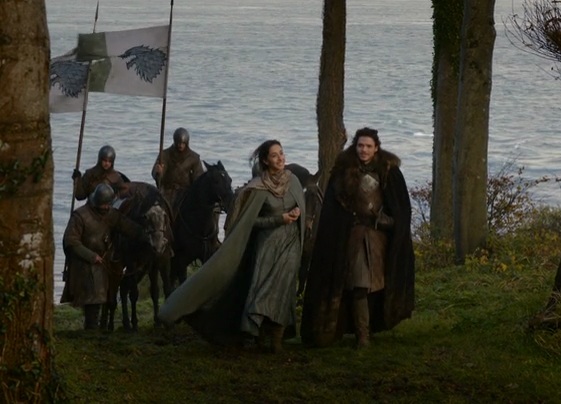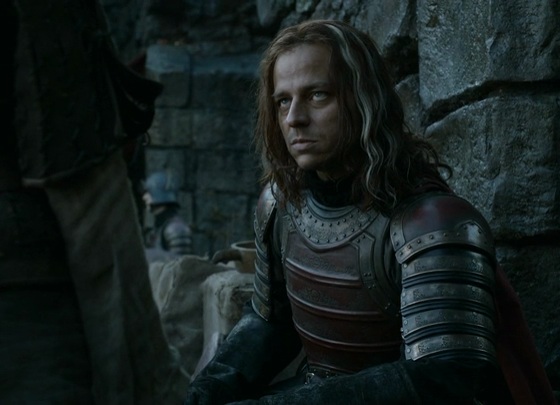Game of Thrones – The Prince of Winterfell
"The Prince of Winterfell" felt, on the one hand, slower than some of the previous episodes this season, and on the other hand, conveyed a more palpable sense of an impending doom. Part of it is because at its heart was a courtship that took its time to get to fruition, but also because many of its storylines led characters closer to a final showdown and not further. Amidst all that, the episode also saw many characters committing to others or to something, from Theon Greyjoy linking his fate to Winterfell, to Stannis Baratheon prematurely finding his hand (as in Hand of the king), and even Shae and Tyrion committing to each other.
The episode starts with the return of one of the many recurring characters of this second season, Yara Greyjoy, a personal favorite. Yara comes to Winterfell as requested by her brother Theon, but instead of bringing five hundred men with her, she relays to him their father's orders to return home, this after insulting him openly. At this point, it is becoming embarrassing to watch Theon try and force his way into a persona he is not cut out for. Here again he couldn't defend his actions in front of his sister who, in just one scene, showed more authority with her men and common sense in tactics than he has done in the last three episodes. It was a nice touch to have her show a bit of affection for her brother, the Iron way... We then moved to what was arguably responsible for slowing down the proceedings, but also gave an undeniable charm to "The Prince of Winterfell." Consider this: Robb Stark, King in the North, is walking with Lady Talisa Maegyr, their horses and men following not too far behind. Both are richly dressed and Robb is talking about his admiration for his father while their steps are almost perfectly synchronized, enhancing the overall picture. You might not have noticed it, or it might now not seem that significant to you, but such an attention to details made every single scene involving those two particularly gratifying. The entire courtship was the high-born rebuttal to the delightful but definitely raunchy conversations between Jon and Ygritte a week ago.Beyond those elements of decorum, the episode also used Lady Maegyr to help us understand what drives the young king. With well-placed questions and insightful comments, the lady got him to speak about his arranged marriage, his father and his ambition in a way actions cannot. His words inspired an admiration visible in her reactions, and when the storyline also covered the lady's motivations and her touching childhood story and resolutions, both their hearts and ours were ready for the next step. When things are developed this way, who could blame him for possibly producing a Snow with her (the name given to 'bastards' in the north). One of the most striking things about those scenes was how they showed Robb has grown into his role as a king. He might not want the Iron Throne, but even Lady Maegyr—who has the fate of the poor and weak at heart—can no longer deny he has the gravitas of a king and that he is trying to be a good one. There is measure in his decisions, whether they are personal or related to warfare. His mother felt his wrath and we could understand his anger. Lady Catelyn Stark showed her commitment to the well-being of her children, while her son's commitment was toward his (very much) larger family. The episode clearly implies he understood his father's words and worried about thousands, not only his own brothers and sisters. When they tackled the brewing love and the weight on Robb's shoulders, David Benioff and D.B. Weiss were at their best with this storyline.It was about time Tywin Lannister took to the battlefield. The lord of Casterly Rock left the scorched ancient castle of Harrenhal to try and surprise Robb Stark and maybe win his first battle against the young and fearless King in the north. Although Tywin's comments on Robb made sense as a generic analysis ("He will risk anything at anytime because he doesn't know enough to be afraid"), that didn't exactly match the young man we saw earlier. It will be interesting to see how that turns out. Having failed to find Jaqen in time to ask him to kill Tywin, Arya lashed out on the strange man, asking him to kill himself in a scene that was both funny and interesting. Arya is too young to fight all of her own battles openly, so the story was well inspired to make use of Jaqen H'ghar, "a man" with an odd set of principles and a fascinating speech who will be missed.
We then moved to what was arguably responsible for slowing down the proceedings, but also gave an undeniable charm to "The Prince of Winterfell." Consider this: Robb Stark, King in the North, is walking with Lady Talisa Maegyr, their horses and men following not too far behind. Both are richly dressed and Robb is talking about his admiration for his father while their steps are almost perfectly synchronized, enhancing the overall picture. You might not have noticed it, or it might now not seem that significant to you, but such an attention to details made every single scene involving those two particularly gratifying. The entire courtship was the high-born rebuttal to the delightful but definitely raunchy conversations between Jon and Ygritte a week ago.Beyond those elements of decorum, the episode also used Lady Maegyr to help us understand what drives the young king. With well-placed questions and insightful comments, the lady got him to speak about his arranged marriage, his father and his ambition in a way actions cannot. His words inspired an admiration visible in her reactions, and when the storyline also covered the lady's motivations and her touching childhood story and resolutions, both their hearts and ours were ready for the next step. When things are developed this way, who could blame him for possibly producing a Snow with her (the name given to 'bastards' in the north). One of the most striking things about those scenes was how they showed Robb has grown into his role as a king. He might not want the Iron Throne, but even Lady Maegyr—who has the fate of the poor and weak at heart—can no longer deny he has the gravitas of a king and that he is trying to be a good one. There is measure in his decisions, whether they are personal or related to warfare. His mother felt his wrath and we could understand his anger. Lady Catelyn Stark showed her commitment to the well-being of her children, while her son's commitment was toward his (very much) larger family. The episode clearly implies he understood his father's words and worried about thousands, not only his own brothers and sisters. When they tackled the brewing love and the weight on Robb's shoulders, David Benioff and D.B. Weiss were at their best with this storyline.It was about time Tywin Lannister took to the battlefield. The lord of Casterly Rock left the scorched ancient castle of Harrenhal to try and surprise Robb Stark and maybe win his first battle against the young and fearless King in the north. Although Tywin's comments on Robb made sense as a generic analysis ("He will risk anything at anytime because he doesn't know enough to be afraid"), that didn't exactly match the young man we saw earlier. It will be interesting to see how that turns out. Having failed to find Jaqen in time to ask him to kill Tywin, Arya lashed out on the strange man, asking him to kill himself in a scene that was both funny and interesting. Arya is too young to fight all of her own battles openly, so the story was well inspired to make use of Jaqen H'ghar, "a man" with an odd set of principles and a fascinating speech who will be missed. Further south at King's Landing, Tyrion almost lost his cool. The ever devious Cersei, who could have passed for a normal person last week, donned her evil-queen clothes once again. The word "game" in Game of Thrones always finds it full meaning in the capital, whether we are following things happening in the king's castle or in the town and its brothels. Visibly cornered by his sister who managed to convince him she had caught his consort, Tyrion, like a good player, never laid down his cards, never uttered Shae's name or anything that would help identify her. I liked how he played his part with solemnity when the wrong girl was introduced, but the most striking moment was the scene with Shae a bit later (Tyrion: "You're mine!" Shae: "I'm Yours?"). Until now, it seems she considered herself as a companion, but not as one he was particularly attached too. Her question seems to indicate that she either revolted against the idea of belonging to anyone, or simply that she was taken by surprise. While Tyrion and Shae were committing themselves to each other, across the Narrow sea, Daenerys committed herself to her dragons, choosing them over her people (whoever they may be), over Jorah Mormont, and over her freedom. The show has already pushed Theon Greyjoy over the edge, having him compete with Joffrey for the title of most despicable character, but the story stays largely open when it comes to the khaleesi. She has been so far like her silver hair, neither white nor black, hovering between the two and finding herself alone in the world, unwilling to give her trust easily and redefining the word "wrath" in her outbursts. "The Prince of Winterfell" didn't show much of Qarth, but it gave the impression our favorite Targaryen princess was about to lean one way or the other.
Further south at King's Landing, Tyrion almost lost his cool. The ever devious Cersei, who could have passed for a normal person last week, donned her evil-queen clothes once again. The word "game" in Game of Thrones always finds it full meaning in the capital, whether we are following things happening in the king's castle or in the town and its brothels. Visibly cornered by his sister who managed to convince him she had caught his consort, Tyrion, like a good player, never laid down his cards, never uttered Shae's name or anything that would help identify her. I liked how he played his part with solemnity when the wrong girl was introduced, but the most striking moment was the scene with Shae a bit later (Tyrion: "You're mine!" Shae: "I'm Yours?"). Until now, it seems she considered herself as a companion, but not as one he was particularly attached too. Her question seems to indicate that she either revolted against the idea of belonging to anyone, or simply that she was taken by surprise. While Tyrion and Shae were committing themselves to each other, across the Narrow sea, Daenerys committed herself to her dragons, choosing them over her people (whoever they may be), over Jorah Mormont, and over her freedom. The show has already pushed Theon Greyjoy over the edge, having him compete with Joffrey for the title of most despicable character, but the story stays largely open when it comes to the khaleesi. She has been so far like her silver hair, neither white nor black, hovering between the two and finding herself alone in the world, unwilling to give her trust easily and redefining the word "wrath" in her outbursts. "The Prince of Winterfell" didn't show much of Qarth, but it gave the impression our favorite Targaryen princess was about to lean one way or the other.

